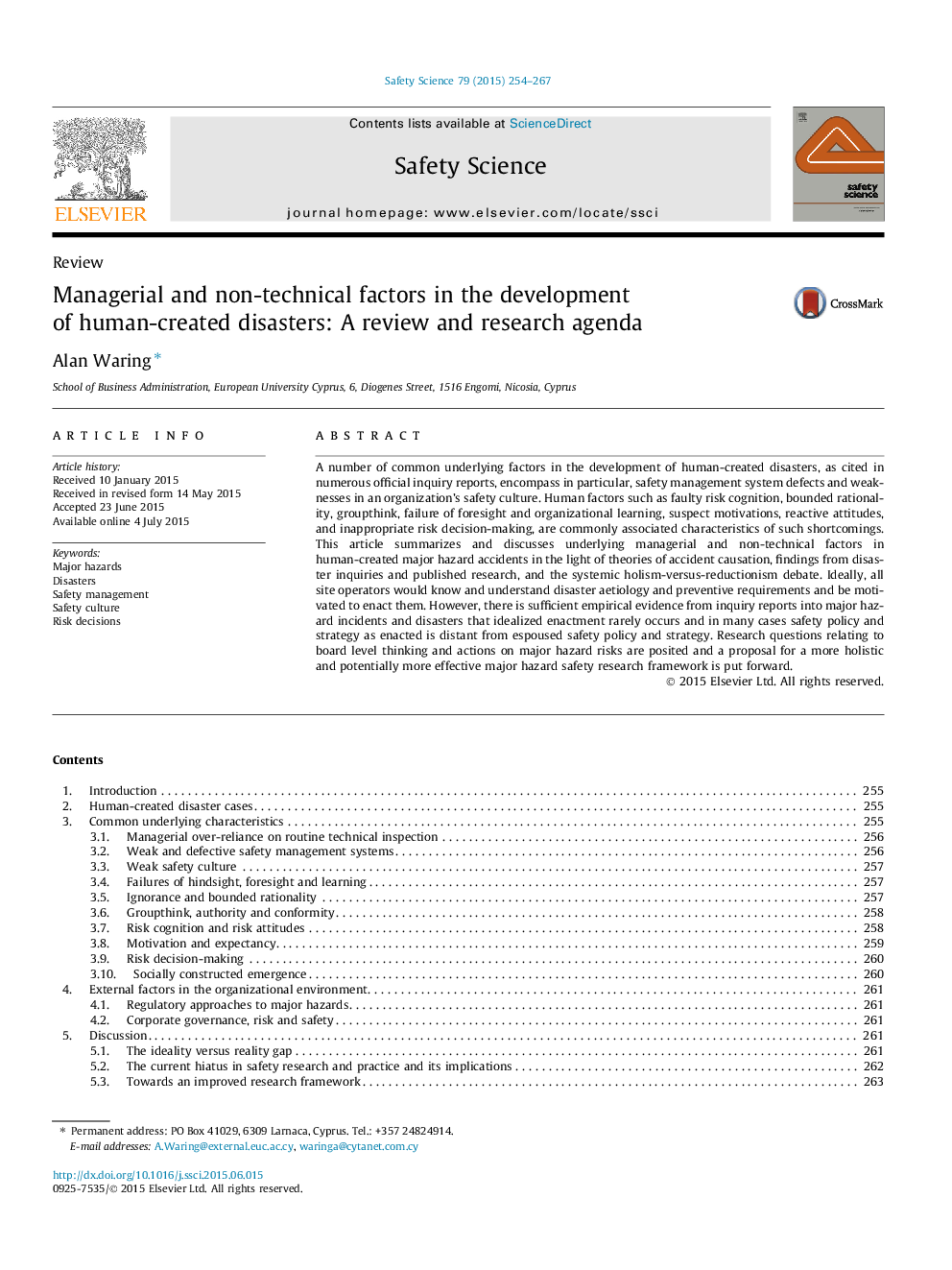| کد مقاله | کد نشریه | سال انتشار | مقاله انگلیسی | نسخه تمام متن |
|---|---|---|---|---|
| 6975693 | 1453392 | 2015 | 14 صفحه PDF | دانلود رایگان |
عنوان انگلیسی مقاله ISI
Managerial and non-technical factors in the development of human-created disasters: A review and research agenda
ترجمه فارسی عنوان
عوامل مدیریتی و غیر فنی در توسعه بلایای انسانی ایجاد شده: یک برنامه بررسی و تحقیق
دانلود مقاله + سفارش ترجمه
دانلود مقاله ISI انگلیسی
رایگان برای ایرانیان
کلمات کلیدی
خطرات عمده، بلایای طبیعی، مدیریت ایمنی، فرهنگ ایمنی، تصمیمات ریسک،
ترجمه چکیده
تعدادی از فاکتورهای اساسی در توسعه بلایای ایجاد شده توسط انسان، همانطور که در گزارش های متعدد رسمی تحقیقاتی آمده است، شامل نقص ها و نقاط ضعف سیستم مدیریت ایمنی در فرهنگ ایمنی سازمان می شود. عوامل انسانی مانند شناخت خطای معیوب، عقلانیت محدود، تفکر گروهی، شکست پیش بینی و یادگیری سازمانی، انگیزه های مشکوک، نگرش های واکنش پذیر و تصمیم گیری ریسکی نامناسب، به طور کلی ویژگی های مربوط به چنین نقص هایی هستند. این مقاله خلاصه و در مورد عوامل مدیریتی و غیر فنی در حوادث مهم خطرناک ایجاد شده درمورد تئوری های علت اتفاقی، نتایج تحقیقات فاجعه آمیز و تحقیقات منتشر شده و بحث های سیستماتیک هولیز در مقابل کاهش ریزگردها خلاصه می کند. در حالت ایده آل، تمام اپراتورهای سایت می دانند و درک علل تخریب و پیشگیرانه فاجعه را می دانند و انگیزه ای برای اعمال آنها دارند. با این حال، شواهد تجربی کافی از گزارش تحقیقات در مورد حوادث و حوادث مهم خطر وجود دارد که تصویب آرمانی آن به ندرت اتفاق می افتد و در بسیاری موارد، سیاست و استراتژی ایمنی که از مقررات ایمنی دور است از سیاست و استراتژی ایمنی حمایت می شود. سوالات تحقیقاتی مربوط به تفکر سطح هیئت مدیره و اقدامات مربوط به خطرات خطر عمده، مطرح شده است و پیشنهادی برای یک چارچوب تحقیق جامع و بالقوه موثرتر در مورد خطر ایمنی خطر بزرگ ارائه شده است.
موضوعات مرتبط
مهندسی و علوم پایه
مهندسی شیمی
بهداشت و امنیت شیمی
چکیده انگلیسی
A number of common underlying factors in the development of human-created disasters, as cited in numerous official inquiry reports, encompass in particular, safety management system defects and weaknesses in an organization's safety culture. Human factors such as faulty risk cognition, bounded rationality, groupthink, failure of foresight and organizational learning, suspect motivations, reactive attitudes, and inappropriate risk decision-making, are commonly associated characteristics of such shortcomings. This article summarizes and discusses underlying managerial and non-technical factors in human-created major hazard accidents in the light of theories of accident causation, findings from disaster inquiries and published research, and the systemic holism-versus-reductionism debate. Ideally, all site operators would know and understand disaster aetiology and preventive requirements and be motivated to enact them. However, there is sufficient empirical evidence from inquiry reports into major hazard incidents and disasters that idealized enactment rarely occurs and in many cases safety policy and strategy as enacted is distant from espoused safety policy and strategy. Research questions relating to board level thinking and actions on major hazard risks are posited and a proposal for a more holistic and potentially more effective major hazard safety research framework is put forward.
ناشر
Database: Elsevier - ScienceDirect (ساینس دایرکت)
Journal: Safety Science - Volume 79, November 2015, Pages 254-267
Journal: Safety Science - Volume 79, November 2015, Pages 254-267
نویسندگان
Alan Waring,
